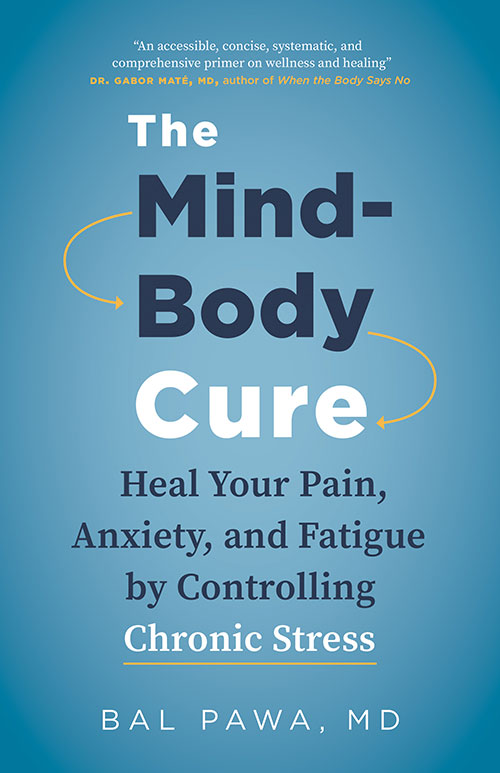Expert Tips to Help You Unplug and Manage Chronic Stress

Dr. Bal Pawa uses an integrative medicine approach with patients at Vancouver's West Coast Women's Clinic. She says by managing chronic stress, we can improve well-being, including immune health. Photo: PeopleImages/Getty Images
As we ride out yet another wave of the pandemic, staying up to date on breaking news and evolving rules has made it harder than ever to unplug, but one B.C. doctor says switching off may be more important than ever.
“We always worry about the diets that we eat, but the emotional diet that we feed our mind is so important. The tech diet,” says Dr. Bal Pawa, a physician of integrative medicine in Vancouver.
“We’re noticing that people who are always checking their phone, their nervous system is always revved up — so they’re probably using more cortisol and adrenalin.”
According to Pawa, excessive stress hormones account for between 75 and 90 per cent of symptoms that bring people to the doctor.
“Your body starts to show you red flags,” she said in a recent interview, explaining that everything from eczema to joint pain to trouble sleeping could be a manifestation of chronic stress.
Do you wake up every night at three or four o’clock? Do you have a hard time getting back to sleep? Pawa says that’s a classic sign — and there’s an immune health connection.
“Sleep is essential because when you get downtime, when your body gets downtime, your nervous system is relaxed — you’re not working out problems. It actually gives your immune system time to repair, and rebuild when it goes awry.”
But what do we do during a pandemic when immunity is just the thing we’re stressed about?
Change Your Mind
As she outlines her book, The Mind-Body Cure: Heal Your Pain, Anxiety, and Fatigue by Controlling Chronic Stress, Pawa says we need to change our mindset.

Our mind operates out of fear or trust, Pawa says. We shouldn’t feel bad about being afraid of getting or spreading COVID-19, because that healthy stress helps keep us safe. But we can reframe those fears.
She uses the example of socializing amid the pandemic, applying what she calls the SODA method (stop, observe, detach, affirm).
“So you stop and listen to your thoughts. You observed them, there’s fear. You detached from the fear. And you say, ‘I can still be safe and keep my friends safe. I’ll have lots of hand sanitizer. I will have masks for them to come in or, we’ll sit outside.'”
“You do all the things to make sure that you’re still safe. And then you affirm a trust-based thought: we can still socialize and be safe.”
As we progress through another wave, focus on how you can connect with friends and family rather than the ways you can’t. Not only will it help you avoid stress hormones, but also, as Pawa points out, trust-based thoughts turn on happy-making serotonin and endorphins. And who couldn’t use more of those these days!
BMW
No, Pawa isn’t selling cars. But she is pushing a form of meditation she calls BMW (breath, mind and word).
It’s part of the first step in the book’s Reframe Toolkit, a seven-step strategy for regulating the nervous system. Pawa attributes the meditation to helping her regain wellness after a car accident left her with years of chronic pain and anxiety.
“I actually had to learn how to breathe again. You breathe very shallow, when you’re in fight or flight,” she says.
“When you take a deep breath, hold it for five seconds, and then exhale, you’ve just slowed down your heart rate, lowered your blood pressure and turned off the gas on your nervous system. So the breath is so important and helps you to relax all your muscles ”
In addition to breathing deeply, Pawa instructs readers to be mindful of their breath and, as you exhale, silently say a word such as peace, amen, home or om.
She notes that, as research shows, adding a word can change brainwave activity.
“You go from these crazy static waves that are all over the place, to these beautiful alpha wave patterns. And that changes your neurotransmitters, to turn off the stress hormones” she explains.
Watch: Dr. Bal Pawa explains how BMW meditation helps reduce stress.
She recommends doing the meditation for 10 to 20 minutes, in the morning and before bed.
It’s All Connected
As she does with her patients, Pawa aims to teach readers about the connection between stress and health, how one can negatively affect the other. But also how taking better care of our health, including through diet, exercise and rest, helps us better manage our reaction to stress.
“The idea that I really want to share is that one, we have a nervous system and, two, how do you regulate it,” she says.
“If we can learn to regulate it, we can actually create health in our body and repair our body. Rather than live in fight or flight, we can go into rest and repair for the body.”
A version of this story was published on Oct. 10, 2020
RELATED:
The Science Behind Physical Pandemic Stress Symptoms and How to Feel Better
How Familiar and Nostalgic Music Can Help Us Cope During Troubling Times